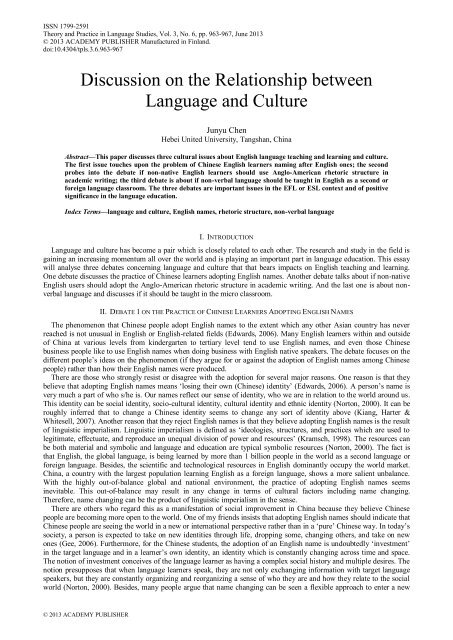Theory and Practice in Language Studies Contents - Academy ...
Theory and Practice in Language Studies Contents - Academy ...
Theory and Practice in Language Studies Contents - Academy ...
You also want an ePaper? Increase the reach of your titles
YUMPU automatically turns print PDFs into web optimized ePapers that Google loves.
ISSN 1799-2591<strong>Theory</strong> <strong>and</strong> <strong>Practice</strong> <strong>in</strong> <strong>Language</strong> <strong>Studies</strong>, Vol. 3, No. 6, pp. 963-967, June 2013© 2013 ACADEMY PUBLISHER Manufactured <strong>in</strong> F<strong>in</strong>l<strong>and</strong>.doi:10.4304/tpls.3.6.963-967Discussion on the Relationship between<strong>Language</strong> <strong>and</strong> CultureJunyu ChenHebei United University, Tangshan, Ch<strong>in</strong>aAbstract—This paper discusses three cultural issues about English language teach<strong>in</strong>g <strong>and</strong> learn<strong>in</strong>g <strong>and</strong> culture.The first issue touches upon the problem of Ch<strong>in</strong>ese English learners nam<strong>in</strong>g after English ones; the secondprobes <strong>in</strong>to the debate if non-native English learners should use Anglo-American rhetoric structure <strong>in</strong>academic writ<strong>in</strong>g; the third debate is about if non-verbal language should be taught <strong>in</strong> English as a second orforeign language classroom. The three debates are important issues <strong>in</strong> the EFL or ESL context <strong>and</strong> of positivesignificance <strong>in</strong> the language education.Index Terms—language <strong>and</strong> culture, English names, rhetoric structure, non-verbal languageI. INTRODUCTION<strong>Language</strong> <strong>and</strong> culture has become a pair which is closely related to each other. The research <strong>and</strong> study <strong>in</strong> the field isga<strong>in</strong><strong>in</strong>g an <strong>in</strong>creas<strong>in</strong>g momentum all over the world <strong>and</strong> is play<strong>in</strong>g an important part <strong>in</strong> language education. This essaywill analyse three debates concern<strong>in</strong>g language <strong>and</strong> culture that that bears impacts on English teach<strong>in</strong>g <strong>and</strong> learn<strong>in</strong>g.One debate discusses the practice of Ch<strong>in</strong>ese learners adopt<strong>in</strong>g English names. Another debate talks about if non-nativeEnglish users should adopt the Anglo-American rhetoric structure <strong>in</strong> academic writ<strong>in</strong>g. And the last one is about nonverballanguage <strong>and</strong> discusses if it should be taught <strong>in</strong> the micro classroom.II. DEBATE 1 ON THE PRACTICE OF CHINESE LEARNERS ADOPTING ENGLISH NAMESThe phenomenon that Ch<strong>in</strong>ese people adopt English names to the extent which any other Asian country has neverreached is not unusual <strong>in</strong> English or English-related fields (Edwards, 2006). Many English learners with<strong>in</strong> <strong>and</strong> outsideof Ch<strong>in</strong>a at various levels from k<strong>in</strong>dergarten to tertiary level tend to use English names, <strong>and</strong> even those Ch<strong>in</strong>esebus<strong>in</strong>ess people like to use English names when do<strong>in</strong>g bus<strong>in</strong>ess with English native speakers. The debate focuses on thedifferent people’s ideas on the phenomenon (if they argue for or aga<strong>in</strong>st the adoption of English names among Ch<strong>in</strong>esepeople) rather than how their English names were produced.There are those who strongly resist or disagree with the adoption for several major reasons. One reason is that theybelieve that adopt<strong>in</strong>g English names means ‘los<strong>in</strong>g their own (Ch<strong>in</strong>ese) identity’ (Edwards, 2006). A person’s name isvery much a part of who s/he is. Our names reflect our sense of identity, who we are <strong>in</strong> relation to the world around us.This identity can be social identity, socio-cultural identity, cultural identity <strong>and</strong> ethnic identity (Norton, 2000). It can beroughly <strong>in</strong>ferred that to change a Ch<strong>in</strong>ese identity seems to change any sort of identity above (Kiang, Harter &Whitesell, 2007). Another reason that they reject English names is that they believe adopt<strong>in</strong>g English names is the resultof l<strong>in</strong>guistic imperialism. L<strong>in</strong>guistic imperialism is def<strong>in</strong>ed as ‘ideologies, structures, <strong>and</strong> practices which are used tolegitimate, effectuate, <strong>and</strong> reproduce an unequal division of power <strong>and</strong> resources’ (Kramsch, 1998). The resources canbe both material <strong>and</strong> symbolic <strong>and</strong> language <strong>and</strong> education are typical symbolic resources (Norton, 2000). The fact isthat English, the global language, is be<strong>in</strong>g learned by more than 1 billion people <strong>in</strong> the world as a second language orforeign language. Besides, the scientific <strong>and</strong> technological resources <strong>in</strong> English dom<strong>in</strong>antly occupy the world market.Ch<strong>in</strong>a, a country with the largest population learn<strong>in</strong>g English as a foreign language, shows a more salient unbalance.With the highly out-of-balance global <strong>and</strong> national environment, the practice of adopt<strong>in</strong>g English names seems<strong>in</strong>evitable. This out-of-balance may result <strong>in</strong> any change <strong>in</strong> terms of cultural factors <strong>in</strong>clud<strong>in</strong>g name chang<strong>in</strong>g.Therefore, name chang<strong>in</strong>g can be the product of l<strong>in</strong>guistic imperialism <strong>in</strong> the sense.There are others who regard this as a manifestation of social improvement <strong>in</strong> Ch<strong>in</strong>a because they believe Ch<strong>in</strong>esepeople are becom<strong>in</strong>g more open to the world. One of my friends <strong>in</strong>sists that adopt<strong>in</strong>g English names should <strong>in</strong>dicate thatCh<strong>in</strong>ese people are see<strong>in</strong>g the world <strong>in</strong> a new or <strong>in</strong>ternational perspective rather than <strong>in</strong> a ‘pure’ Ch<strong>in</strong>ese way. In today’ssociety, a person is expected to take on new identities through life, dropp<strong>in</strong>g some, chang<strong>in</strong>g others, <strong>and</strong> take on newones (Gee, 2006). Furthermore, for the Ch<strong>in</strong>ese students, the adoption of an English name is undoubtedly ‘<strong>in</strong>vestment’<strong>in</strong> the target language <strong>and</strong> <strong>in</strong> a learner’s own identity, an identity which is constantly chang<strong>in</strong>g across time <strong>and</strong> space.The notion of <strong>in</strong>vestment conceives of the language learner as hav<strong>in</strong>g a complex social history <strong>and</strong> multiple desires. Thenotion presupposes that when language learners speak, they are not only exchang<strong>in</strong>g <strong>in</strong>formation with target languagespeakers, but they are constantly organiz<strong>in</strong>g <strong>and</strong> reorganiz<strong>in</strong>g a sense of who they are <strong>and</strong> how they relate to the socialworld (Norton, 2000). Besides, many people argue that name chang<strong>in</strong>g can be seen a flexible approach to enter a new© 2013 ACADEMY PUBLISHER
















